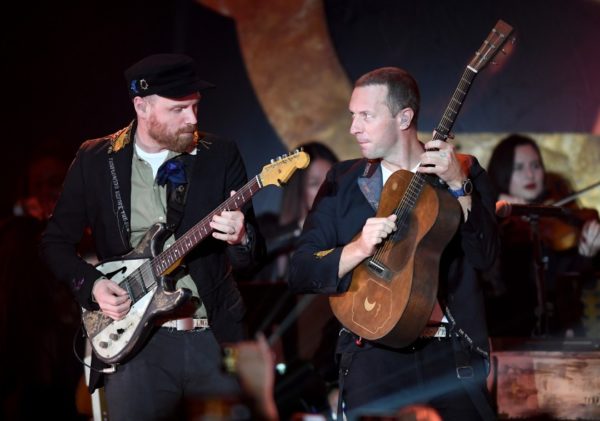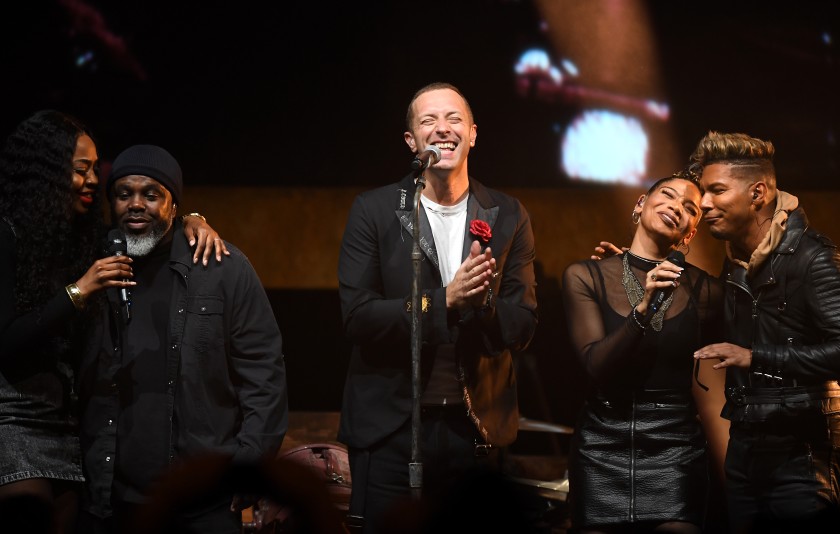“One solitary balloon.”
That was the extent of Coldplay’s live production, as frontman Chris Martin described it, when the British band performed Monday night at the Hollywood Palladium behind its ambitious new album, “Everyday Life.”
In truth, the concert contained a bit more spectacle than Martin let on, including a string section, hundreds of twinkly lights and a guest appearance by Nigeria’s Femi Kuti.
But you took the singer’s point: Compared with the open-air extravaganza Coldplay presented at the Rose Bowl on its last tour — “We had fireworks and we had confetti and we had lasers and we had 80,000 shining wristbands,” Martin recalled — the lonely inflatable floating through the Palladium during “Fix You” did strike a minimalist note.
“All of you are witness to the least amount of money we’ve ever spent on special effects,” Martin told the capacity crowd of approximately 4,000. “And we didn’t even pay for this one — one of you brought this.”

Coldplay frontman Chris Martin, right, performs with guitarist Jonny Buckland.
(Wally Skalij / Los Angeles Times)
The relatively stripped-down show, held on Martin Luther King Jr. Day, was a benefit for Reform L.A. Jails, which seeks civilian oversight of the Los Angeles County Sheriff’s Department, as organizer Patrisse Cullors explained onstage Monday. (Martin is evidently serious about criminal-justice reform: On “Ellen” last week, he presented Ellen DeGeneres with a copy of Michelle Alexander’s book “The New Jim Crow,” telling the host, “It’s all about how too many people are in prison.”)
The gig was part of Coldplay’s SoCal staycation in support of “Everyday Life,” which uses textures from Africa and the Middle East to punch up songs about gun violence and police brutality. When the album came out in November, Martin told the BBC that the group had decided not to travel the world until it could figure out how to do so in an environmentally sustainable fashion.
So instead of a conventional tour, Coldplay scheduled a series of shows in Martin’s part-time hometown, including intimate performances sponsored by KROQ-FM and SiriusXM; the band was set to return to the Palladium on Tuesday night for a Grammy Week event open to people with Citi credit cards.

Coldplay’s Chris Martin performs with the For Love Choir.
(Wally Skalij / Los Angeles Times)
“We love playing in L.A. more than you could possibly understand,” Martin said not long into Monday’s gig — one way to put some heart behind all those corporate alliances. Then he added that many of the songs Coldplay was doing were “born in L.A., like so many of you.”
Perhaps that neighborly vibe was why Martin, whose onstage demeanor typically brings to mind a jittery teen, seemed so relaxed Monday, even when he was bemoaning the scourge of systemic racism, as in “Trouble in Town,” which on Coldplay’s new album is threaded with what sounds like a body-cam recording of an abusive cop.
During “Cry Cry Cry” and “Broken,” two gospel- and early-rock-inspired cuts from “Everyday Life,” he was grinning as he harmonized with members of a vocal quartet he introduced as the For Love Choir. Elsewhere in the 75-minute set, he started “Amsterdam,” an obscure Coldplay oldie, before deciding with a laugh that he couldn’t remember enough of the lyrics to go on.
For “Arabesque,” a new song with a driving beat and a searing saxophone lick, Coldplay brought out Kuti, whose father, Fela, pioneered the Afrobeat genre half a century ago. Then Martin wandered to the rear of the stage, evidently happy just to listen in the shadows, as Femi Kuti led several horn players through a composition of his own.
As Martin himself admitted, it all registered as quite a shift from the Rose Bowl, where the singer sang “Magic” as a video screen showed him with a pair of angel wings superimposed on his body. In the band’s encore Monday, Coldplay reached back to its 2000 debut for the very pretty “Sparks,” in which Martin promises a lover, “I’ll always look out for you.”
But even though he’d turned up to lend his celebrity to a worthy cause, Martin wasn’t trying to make himself look like a hero.
“Everyone thinks this is a romantic song, but it’s really just about boobs,” he said. “Most of our stuff is, ultimately.”




